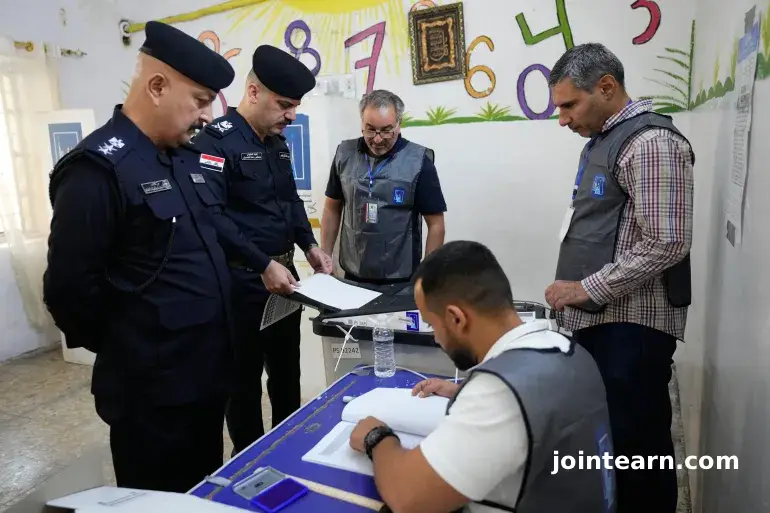
BAGHDAD, Iraq — Iraq has launched special voting ahead of the 2025 parliamentary elections, with members of the security forces and internally displaced persons (IDPs) casting their ballots on Sunday, two days before the general polls. The vote marks a crucial step in Iraq’s political process, as the country navigates ongoing challenges of corruption, voter apathy, and security concerns.
Over 1.3 Million Security Personnel Participate in Early Voting
Polling stations opened at 7 a.m. local time (04:00 GMT) across 809 centers nationwide, allowing more than 1.3 million members of Iraq’s security forces — including the army, police, and intelligence units — to vote before being deployed to secure the nationwide polls scheduled for Tuesday, November 11.
Voting will continue until 6 p.m. (15:00 GMT), the Iraqi News Agency (INA) reported, as authorities work to ensure smooth and transparent operations.
Interior Minister Abdul Amir al-Shammari stated that the early voting process was proceeding “smoothly and in an organized manner,” emphasizing the importance of this phase for national security and election integrity.
Displaced Iraqis Cast Ballots Across 27 Locations
Alongside the security forces, more than 26,500 internally displaced Iraqis are also eligible to cast their votes on Sunday. Balloting for displaced persons is being held at 97 polling stations in 27 different areas across the country.
These IDPs include citizens uprooted by previous conflicts against ISIS and ongoing instability in certain provinces. Iraqi officials say special provisions have been made to ensure that displaced voters can participate despite bureaucratic and logistical hurdles.
Tuesday’s National Vote: Over 21 Million Eligible Voters
On Tuesday, the main round of voting will open to 21 million registered Iraqis across 4,501 polling stations nationwide, according to INA. This will be the sixth parliamentary election since the 2003 U.S.-led invasion that toppled former ruler Saddam Hussein.
More than 7,750 candidates are competing for the 329 seats in parliament, with nearly one-third being women. Iraq’s electoral law reserves 25 percent of seats for women and nine seats for religious minorities, reflecting the country’s diverse social fabric.
The current parliament, which began its term on January 9, 2022, is set to conclude on January 8, 2026.
Revival of Old Electoral Law Sparks Debate
This year’s election will use an older electoral framework, reinstated in 2023, which analysts say favors larger political parties and entrenched blocs. During the 2021 elections, around 70 independents secured parliamentary seats, but only 75 independents are running this year, raising concerns about reduced political diversity.
Observers also warn that voter turnout could fall below the record low of 41% recorded in 2021, amid growing public distrust in political leaders, allegations of corruption, and disillusionment with Iraq’s power-sharing system.
Corruption Allegations and Candidate Disqualifications
Ahead of the election, 848 candidates were disqualified by the country’s election commission — in some cases for vague or politically motivated reasons such as “insulting religious rituals” or criticizing armed forces.
Accusations of vote-buying and campaign bribery have also surfaced, with watchdog groups calling for stricter oversight to preserve electoral credibility.
Violence and Political Tensions Shadow the Election
Historically, Iraqi elections have been marred by violence, including assassinations of candidates, attacks on polling stations, and clashes between rival political blocs. While the overall level of unrest has decreased, one candidate was assassinated during the campaign period leading up to the 2025 vote, raising fears of renewed volatility.
Prominent Shia cleric Moqtada al-Sadr, whose bloc won the most seats in 2021 before withdrawing from parliament, has urged his followers to boycott what he described as a “flawed election”. Al-Sadr withdrew from Iraq’s political process after failed negotiations with rival Shia factions over government formation.
Key Political Figures and Coalitions
The election is expected to shape Iraq’s political landscape for the next four years. Prime Minister Mohammed Shia al-Sudani, elected in 2022 with the backing of pro-Iran Shia parties, is seeking a second term and is widely expected to secure a strong bloc.
Other major contenders include former Prime Minister Nouri al-Maliki and influential Shia scholar Ammar al-Hakim.
By convention in post-2003 Iraq:
- The Prime Minister is always a Shia Muslim,
- The Speaker of Parliament is a Sunni Muslim, and
- The President is a Kurd — reflecting Iraq’s delicate sectarian balance.
What’s at Stake
The outcome of Iraq’s 2025 parliamentary election will determine the composition of the next government, influence foreign relations with Iran and the United States, and affect the country’s economic recovery after years of instability.
With corruption, unemployment, and weak governance dominating voter concerns, the election is seen as a critical test for Iraq’s fragile democracy.


Leave a Reply